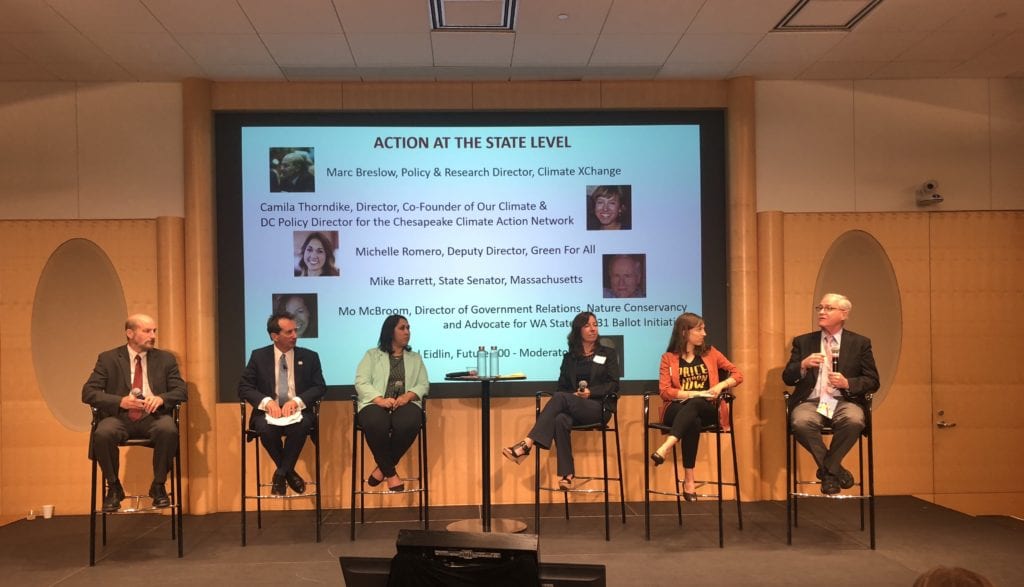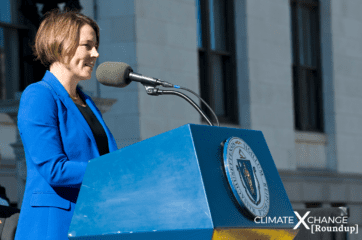
California governor Jerry Brown opened the Global Climate Action Summit this week, days after committing his state to new ambitious steps to fight climate change. The summit commenced with a speech from Brown, who was joined by leaders representing cities, global corporations, and leading climate nonprofits from around the world.
California kicked the summit off by passing bill SB 100, pledging the state—the world’s fifth largest economy—to source 100 percent of its electricity from renewables by 2045. This is a bold step forward for California, which is already home to one of the largest global carbon markets. The announcement set the tone for a week of events meant to raise global ambitions heading into global climate negotiations this December in Katowice, Poland.

Climate XChange’s Dr. Marc Breslow sits on a state-level policy panel at Thursday’s Carbon Tax Forum, a Global Climate Action Affiliate Event.
The city was bustling with action as global leaders packed into meeting halls and activists took to the streets. Climate XChange was at the heart of the action at the Carbon Tax Forum, hosted by Gap Inc and leading brands focussed on carbon pricing. The event featured business and political leaders from both sides of the aisle who are vested in putting a price on carbon. Highlights of the event included a message from Congressman Carlos Curbelo from Florida, Future 500, Green For All, State Senator Mike Barrett as well as our very own Dr. Marc Breslow.
One of the most ambitious announcements at the conference came from global homegoods corporation Ikea, who announced they were switching to a zero carbon delivery fleet, which is expected to encourage more customers to leave their cars and home and visit Ikea stores by bike or public transport. At larger scale, the company has invested $2 billion in renewables, and by 2020 hopes to be generate more energy than it consumes in its operations.
“Taking action on climate change is not only the right thing to do for people and the planet, it’s necessary for our long-term success as a business. Setting science-based targets will challenge us to find new and better ways, as well as drive innovation and renewal in our business. We encourage other companies to join us in accelerating the transition to a low-carbon economy which boosts investment, employment and innovation.” says Pia Heidenmark Cook, Chief. This is a significant and encouraging step by a major global corporation.
While the conference and surrounding events were filled with positive energy, it was not all smooth sailing for Governor Brown, who has faced continued criticism for his silent support of fossil fuel extraction and transport in the Golden State. Oil and gas currently employs around 368,100 in California and generates $66 billion in revenue for the state. While we salute the new legislature’s new renewable energy bill, , long term targets hold little accountability for politicians currently in office. While planning is necessary for large-scale emissions reductions, it is only effective when combined with regulatory programs in the present. Current officials will be out of office when the deadline roles around and action is needed now, not midway through the century when the window for action has closed.
The other announcements released this week ranged in topic and featured a flurry of catch phrases, from a commitment to “Under2” and “Science Based Targets”, to new coalitions and partnerships. The stakes are higher than ever for meaningful climate action, as the UN Secretary General raised in his opening statements that we have less than two years to drastically change our global direction in order to meet our goals under the Paris Agreement.
It is hard to ignore the impacts that climate threats are having on the U.S. economy. According to Citigroup, GDP lost to climate change will likely reach $44 trillion by 2060. Many corporations understand this, and therefore have taken climate action as a smart and necessary businesses decision. But while there has been high industry engagement and increasing number of corporate engagement in climate action, this needs to go hand-in-hand with legislation. Under a carbon pricing scheme

Climate XChange’s Michael Green moderates a panel on carbon pricing campaigns at Thursday’s Carbon Tax Forum, a Global Climate Action Summit Affiliate Event.
, we have the opportunity to take that much-needed legislative step to set a higher speed for the transition away from fossil fuels, while at the same time spurring innovation and strengthening local economies.








